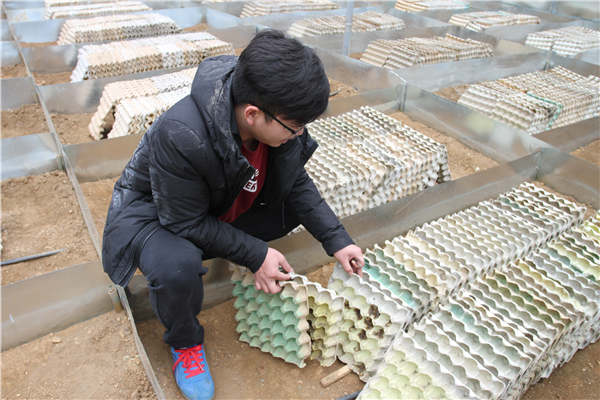 |
|
Lan Tianting, a local, works at the farm, where scorpions are bred as part of Guangxi's poverty alleviation program. |
Pharma and food
More than 2,000 people live across 10 villages in the vicinity. The residents raise pigs or poultry and grow corn mostly for personal consumption as they have little access to markets from such a remote area. Besides, the topography allows crop farming only to an extent and groundwater availability is scarce.
In Nongjing, Mesobuthus martensii, aka Manchurian scorpion, is among the main varieties bred artificially. Found in China and other parts of East Asia, where moisture levels are sufficient, a full-grown arachnid is 6 centimeters long and has sharp pincers and a deadly telson.
A female is usually larger than a male and natural breeding can take two years. But the process is completed in a few months on the village farm.
Qiu says, this year, the farm expects to make more than 1.5 million yuan from sales. The current market price for a kilogram of scorpions is 930 yuan. Nongjing is looking to meet the demand in the provinces of Guangdong, Henan and Shangdong, where the bulk of the arachnids will be sold for pharmaceutical purposes.
Scorpion toxins are used in traditional Chinese medicine to "smoothen the flow of blood in the human body". The arachnid is also eaten as a snack.
"The community is working together on this project. We want to build a brand around it," says Lan Tianting, 25, whose one job is to segregate female and male scorpions.
Although most of his peers work outside Dahua, the county where the village is located, Lan says he returned in the hope of a rise in local employment. He attended college in Guangxi's touristy city of Guilin. His 42-year-old colleague, Meng Zhiyao, despite holding a different background, seems to share Lan's enthusiasm for the project.
Meng, who spent much of his youth in poverty, says he has applied for low-interest housing loan since he started to work here. He has six children and an elderly mother to care for.
Huang Jing, a senior county official, says farms to raise cows and bamboo rats have also been built in two other villages where poverty alleviation is being targeted. Last year, 15 million yuan was set aside by the local government to supplement livelihoods in at least six such villages, he adds.
Of the county's 460,000 people, some 80,000 live in poverty, according to another official.